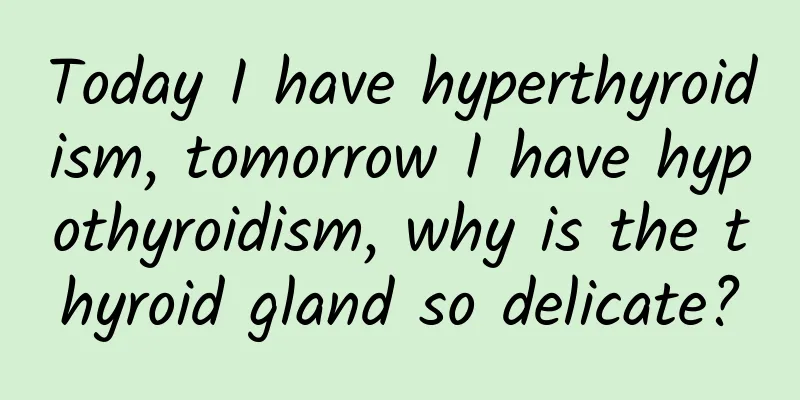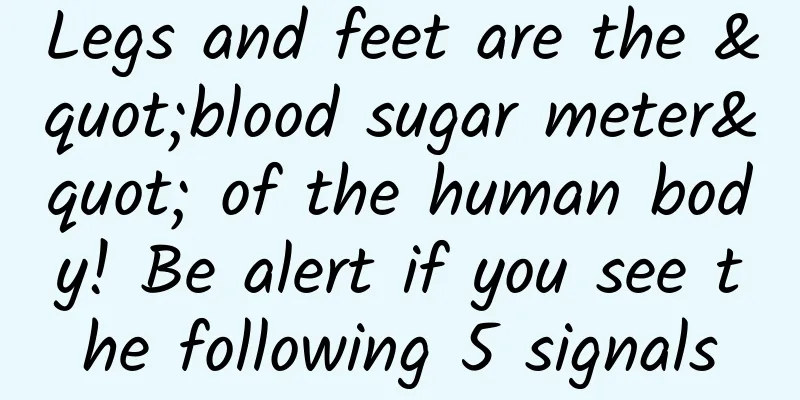Today I have hyperthyroidism, tomorrow I have hypothyroidism, why is the thyroid gland so delicate?

|
Audit expert: Qu Bo Chief Physician of General Surgery, Yangtze River Shipping General Hospital The thyroid gland is an endocrine organ in the human body, located in the neck. It is small in size, only 20-30 grams, and its position is not very conspicuous. Source: Baidu Encyclopedia However, such an easily overlooked organ often acts up - a nodule today, hyperthyroidism or hypothyroidism tomorrow. Why is this? How does the thyroid gland play a leading role? To understand why the thyroid gland is prone to problems, let's start with its important role. In the human body, which is a big factory, the endocrine system regulates the information exchange between cells inside the body. Our body produces a variety of secretions through endocrine organs (glands) such as the thyroid gland, which are very important for the normal functioning of the human body. Source: Junior high school biology textbook The main regulation methods of the human body are neural regulation and hormonal regulation. The regulation mechanism of the thyroid gland belongs to the latter. It regulates various organs of the human body by secreting thyroid hormones. Although its content is very small, it acts as an information molecule in the body and is transported to all parts of the body with body fluids. After receiving the signal of thyroid hormone, each organ (or cell) will strengthen the activity in the cell, increase the excitability of the cell, increase heat production, and stimulate nerve cells to enhance the excitability of the nervous system, making the body more energetic. At the same time, the higher the concentration of thyroid hormone, the stronger the promotion of cell metabolism. Therefore, thyroid hormone is a "true" cheerleader, cheering and cheering for the body's cells. Source: People's Education Press High School Biology Textbook Elective 1 Is more thyroid hormone better? It is not difficult to know from the above that the activity intensity of body organs is affected by the concentration of thyroid hormones. So is the more thyroid hormones, the better? Of course not! Once the concentration of thyroid hormones in the human body is destroyed, too much (or too little) thyroid hormones are produced, and the body will have a hyperthyroidism (or hypothyroidism) reaction. Hyperthyroidism, the full name is hyperthyroidism. When the thyroid hormones are secreted excessively, the human body will be excited, insomnia, hyperactivity, and nervous. In addition, due to the increased cell respiration rate and increased energy consumption, the human body will gradually lose weight. At the same time, the patient will also have symptoms of hyperactivity and irritability due to high energy. Source: NetEase News The opposite of hyperthyroidism is hypothyroidism, which is called hypothyroidism. When the thyroid hormone secretion is too low, the human body will be listless, like to sleep, weak all over, memory decline, and even induce dementia. Source: NetEase News Of course, there are many causes of thyroid disease. The most common causes are as follows: The synthesis of thyroid hormones requires the participation of iodine. If the body's iodine intake is insufficient, the thyroid gland will fall into the dilemma of "a good cook cannot cook without rice", resulting in insufficient synthesis of thyroid hormones. In addition, the work of the thyroid gland is also controlled by other glands, such as the hypothalamus and pituitary gland. If these glands are dysfunctional (such as abnormal secretion of thyrotropin-releasing hormone by the hypothalamus or abnormal secretion of thyroid-stimulating hormone by the pituitary gland), it will also lead to abnormal work of the thyroid gland. If these abnormalities are not taken seriously, the thyroid gland will work under abnormal external conditions for a long time, which will "exhaust" and induce thyroid nodules, causing irreversible damage to the thyroid gland. Therefore, although it is not conspicuous, we should also give it enough care. Source: bangqu Although thyroid nodules may not feel painful or itchy, they may actually turn into cancer. There are two types of nodules: benign and malignant. If they are diagnosed as benign, you don't need to be too nervous because they will not develop into cancer. But if they are malignant, you must be careful and must treat them in time. If you let them develop, they may develop into cancer. Therefore, frequent observation and early treatment can prevent them from happening. Source: Wikipedia Take care of your thyroid gland, self-examination and prevention are the key! The thyroid gland itself has a huge workload, and coupled with the fact that it is affected by internal and external environmental factors, it is not surprising that the thyroid gland is always sick. So how can we prevent and detect it early? Take iodized salt in moderation In daily life, the simplest and most effective way is to provide the thyroid gland with sufficient iodine raw materials, so that the thyroid gland is "worry-free" and helps the smooth synthesis of thyroid hormones. The intake of iodized salt can well meet the thyroid gland's demand for iodine. However, excessive intake of iodine should not be excessive. Excessive intake will cause hypothyroidism and even cause thyroid cancer. Therefore, the intake of iodized salt must be moderate. Generally speaking, it is normal to consume 50-1000 micrograms of iodine a day, which is about six spoons of iodized salt. Therefore, as long as you do not consume too much iodized salt, it will not harm your health. Source: pexels Self-examination at home Daily checkups can also help us understand the working status of the thyroid gland. If we feel obvious swelling and pain when touching the neck (as shown in the picture below), can clearly see a lump in the neck, feel obvious pain in the neck when swallowing, or clearly feel that our body has the abnormalities mentioned above, we should be vigilant and go to the hospital for further diagnosis. Diagram of thyroid self-examination location Source: Healthy China Regular medical check-ups In the long run, physical examinations are essential. Through blood tests, the content of thyroid hormones can be accurately known, which is convenient for doctors to diagnose and treat. In the test report, the content of thyroid hormones and hormones related to thyroid hormones is a very important indicator. By checking these data, doctors can determine whether there is a problem with the thyroid itself or other glands. For example, if a patient has a very high thyroid hormone level, it means that the thyroid gland itself has no problem with its synthesis function, but is caused by abnormalities in other glands. If the thyroid hormone level is low, there may be a problem with the thyroid gland itself or other glands, which requires further testing. Of course, if we are diagnosed with a thyroid-related disease, there is no need to panic. As long as we receive reasonable treatment and follow the doctor's advice, the thyroid gland can still recover and "revive" to continue to contribute to our bodies! |
<<: Waste becomes fuel, wood itself can't imagine
>>: As a large cat, it makes sense for it to meow!
Recommend
How does keep promote itself? What are the points worth learning from?
Keep has currently gone through 5 rounds of finan...
Huawei's car intelligent system patent was exposed again. It had applied for an autonomous driving patent three years ago.
It is not the first time that Huawei’s patents in...
How to write good copy? Learn these 17 methods!
1. First you need to digest the information about...
Want to walk from Car 8 to Car 9? Unless you stop the train...
Audit expert: Zhou Hongzhi Senior Experimentalist...
Fairy-like, the third phase of "Nantianmen" is connected to the subway? Netizens: Journey to the West is still too conservative
March 24 A netizen posted a video on a bridge in ...
Luo Zhixiang is embroiled in a scandal. How can brands provide quick emergency assistance?
When a star falls from grace and is embroiled in ...
How much does it cost to attract investment for the Lincang Transportation Mini Program? What is the investment price for the Lincang Transportation Mini Program?
How much does it cost to attract investment for t...
How much does it cost to create an e-book applet in Yingkou?
How much does it cost to join the Yingkou e-book ...
Teach you how to create explosive short videos and easily monetize them
01 Changes in the communication model: From manua...
Sometimes, involution is also a waste of time | Scientific reverie
When paddling hard, don't forget to look up a...
You can lose weight by starving yourself, but it will hurt your brain...
I ate and drank to my heart's content for a w...
Fan Jian's "Latest Taobao Tmall Courses" series of tutorials to increase conversion rate by at least 200% (Advanced)
Course Contents: Lesson 1: Completely restore the...
Why are we attracting new users but no highly active users are left?
Some operators may feel puzzled. Why do they spen...
The ultimate way to keep warm is to eat?! What foods can keep the body warmer?
Winter is coming, and many people are concerned a...
Zhihu's latest recommendation algorithm
Why do some people’s answers on Zhihu always have...









